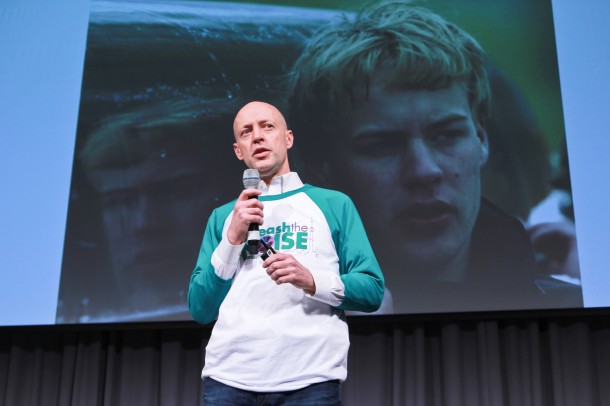
Over 200 people marched on Queen’s park, demanding change. Dressed in white T-shirts despite below-freezing temperatures, and wearing matching purple sunglasses, they chanted.
“We want noise! We want noise!”
The group comprised students from every province and territory in Canada. They were frustrated, but prepared to work for amelioration. They were ready to talk about mental illness, and how to better address the issue many still don’t want to admit exists.
Last weekend in Toronto, these young people unleashed the noise building inside them, and they were loud. The hashtag #unleashthechange was trending in Toronto, ON, within a few hours of the conference kickoff.
***
As a first-year university student at Queen’s University, a resident on campus, and an athlete, Jack Windeler appeared to be doing well.
But as the year progressed, Jack became increasingly withdrawn from his friends and family.
In March 2010, he died unexpectedly by suicide. Jack’s father Eric Windeler says he was likely dealing with depression, but he didn’t feel comfortable talking about it.
Since the tragedy, the Windeler family has been devoted to honouring his legacy through an organization called The Jack Project, which engages youth and the adults in their lives in mental health.
Eric Windeler says the role of resident advisors and peers in university residents is paramount to helping people deal with mental illnesses.
“They are often is the best position to notice signs of distress among new students,” he said.
“Their role, in my view, is not to be counsellors, but supports who can make the initial contact with a student who may need help.”
In an effort to further engage young people, Windeler and Queen’s students created a movement that would engage young people from across the country. Unleash the Noise was born. It was the first mental health innovation summit in Canada, bringing together more than 200 students ages 15 to 24 from across Canada to Toronto.
Justin Scaini, coordinator for Unleash the Noise had clear vision for the conference.
“The goal was to create a whole bunch of creative and innovative ideas on how to approach mental health, how to change the way the entire generation is thinking about mental health.”
As the conference progressed, a common theme emerged from the student discussions: the role of university residence leaders is vital in supporting people who are experiencing mental illness.
Janis Whitlock, a psychologist at Cornell, found that almost eight per cent of university student to started university with no mental illness eventually developed symptoms and five per cent of those who had a history of mental illness would experience an increase in their symptoms. Residence leaders are often the first to spot the signs.
“The role of [residence leaders] was addressed by every discussion group. It is a very important issue. University is a transition.
You’re kind of cradled in high school and it goes from the cradling to the real world, by yourself, with less support staff, or at least less support that you’re aware,” said Max Silverbrook a student leader at the summit.
In a changing world, it can be difficult to unplug and relax. Pressures to be the best student, snag the best job, be the best athlete are taking their toll on students attempting to transition from high school to university.
Approximately 20 per cent of Canadian youth are affected by a mental illness. Twenty four per cent of all deaths among 15-24 year olds account from suicide. It’s the second leading cause of death for the age group.
Only one of five youth suffering with mental illness receive the services they need.
***
Aaron Brown is a third-year English student at Nipissing University in North Bay, ON. As a residence advisor he wants to help students find support systems.
“Students need to know what resources are available in the community for them to go to for help and support. Sometimes I am just a bridge for them,” said Brown. “It’s really important in regards to mental health, because we are one more person students can go to and it’s nice because we’re peers, we’re not just authority figures. We’re students too.”
Residence leaders are not only a bridge between students and resources, but they often the first responders in times of crisis. Windeler says the training they receive is vital to ensure students don’t feel alone as they are dealing with mental illnesses. Although many schools were already on their way to creating a better mental health landscape, Windeler thinks a personal story may have helped nudge them in the right direction.
“I believe the power of Jack’s story has helped immensely, especially in engaging students in this important discussion.”
As the stigma surrounding mental illnesses lessens, resources and training are being revamped. Mental Health First Aid is one of these programs. It’s provided by the Mental Health Commission of Canada. “Just as physical first aid is administered to an injured person before medical treatment can be obtained, MHFA is given until appropriate treatment is found or until the crisis is resolved,” its website states.
Scaini and his team of student organizers have clued in to this action-based philosophy. Unlike other conferences, once Unleash the Noise concluded last Saturday, the real work began. And soon, it will be up to students across Canada to spread the word.
“We’re going to collect all of this information and then over the summer, I will be synthesizing into a logical, cohesive strategy that we can then give to delegates, give to students across the country that they can then give back into their own communities.”
Whatever message comes of the conference, Windeler, Scaini, and other leaders in the mental health realm won’t be the only people calling for change.
“I think it’s the role of ALL student leaders to become more aware of the critical importance of mental health as part of our overall health,” says Windeler.
With Files From Bridget Yard